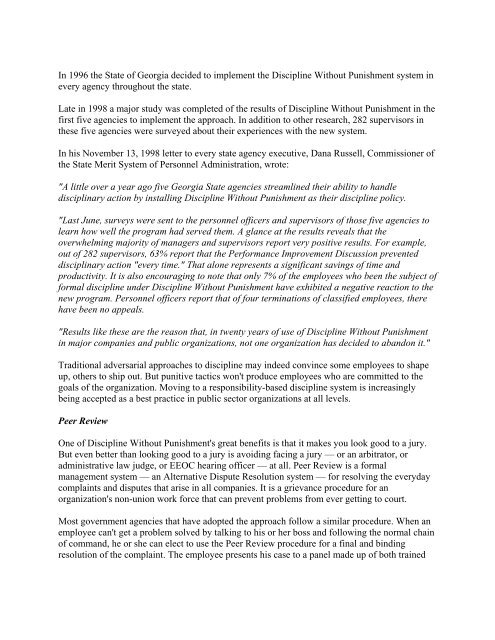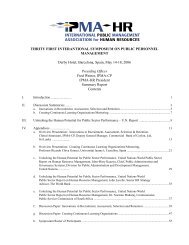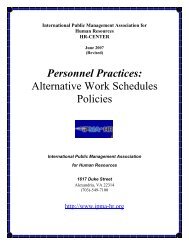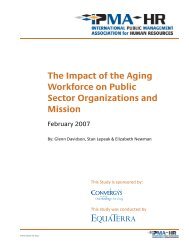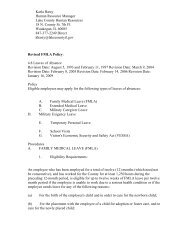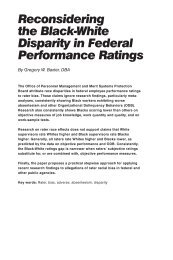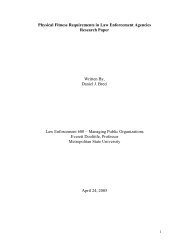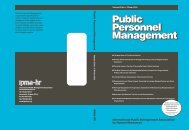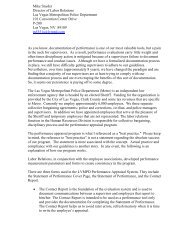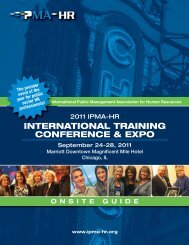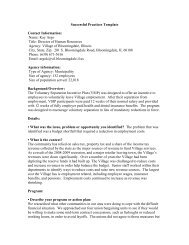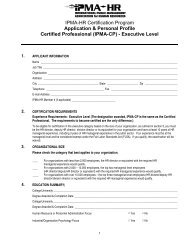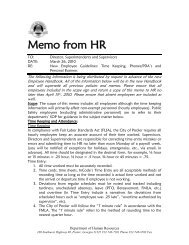Public Sector Organizations: Today's Innovative Leaders In ... - IPMA
Public Sector Organizations: Today's Innovative Leaders In ... - IPMA
Public Sector Organizations: Today's Innovative Leaders In ... - IPMA
- No tags were found...
You also want an ePaper? Increase the reach of your titles
YUMPU automatically turns print PDFs into web optimized ePapers that Google loves.
<strong>In</strong> 1996 the State of Georgia decided to implement the Discipline Without Punishment system inevery agency throughout the state.Late in 1998 a major study was completed of the results of Discipline Without Punishment in thefirst five agencies to implement the approach. <strong>In</strong> addition to other research, 282 supervisors inthese five agencies were surveyed about their experiences with the new system.<strong>In</strong> his November 13, 1998 letter to every state agency executive, Dana Russell, Commissioner ofthe State Merit System of Personnel Administration, wrote:"A little over a year ago five Georgia State agencies streamlined their ability to handledisciplinary action by installing Discipline Without Punishment as their discipline policy."Last June, surveys were sent to the personnel officers and supervisors of those five agencies tolearn how well the program had served them. A glance at the results reveals that theoverwhelming majority of managers and supervisors report very positive results. For example,out of 282 supervisors, 63% report that the Performance Improvement Discussion preventeddisciplinary action "every time." That alone represents a significant savings of time andproductivity. It is also encouraging to note that only 7% of the employees who been the subject offormal discipline under Discipline Without Punishment have exhibited a negative reaction to thenew program. Personnel officers report that of four terminations of classified employees, therehave been no appeals."Results like these are the reason that, in twenty years of use of Discipline Without Punishmentin major companies and public organizations, not one organization has decided to abandon it."Traditional adversarial approaches to discipline may indeed convince some employees to shapeup, others to ship out. But punitive tactics won't produce employees who are committed to thegoals of the organization. Moving to a responsibility-based discipline system is increasinglybeing accepted as a best practice in public sector organizations at all levels.Peer ReviewOne of Discipline Without Punishment's great benefits is that it makes you look good to a jury.But even better than looking good to a jury is avoiding facing a jury — or an arbitrator, oradministrative law judge, or EEOC hearing officer — at all. Peer Review is a formalmanagement system — an Alternative Dispute Resolution system — for resolving the everydaycomplaints and disputes that arise in all companies. It is a grievance procedure for anorganization's non-union work force that can prevent problems from ever getting to court.Most government agencies that have adopted the approach follow a similar procedure. When anemployee can't get a problem solved by talking to his or her boss and following the normal chainof command, he or she can elect to use the Peer Review procedure for a final and bindingresolution of the complaint. The employee presents his case to a panel made up of both trained


